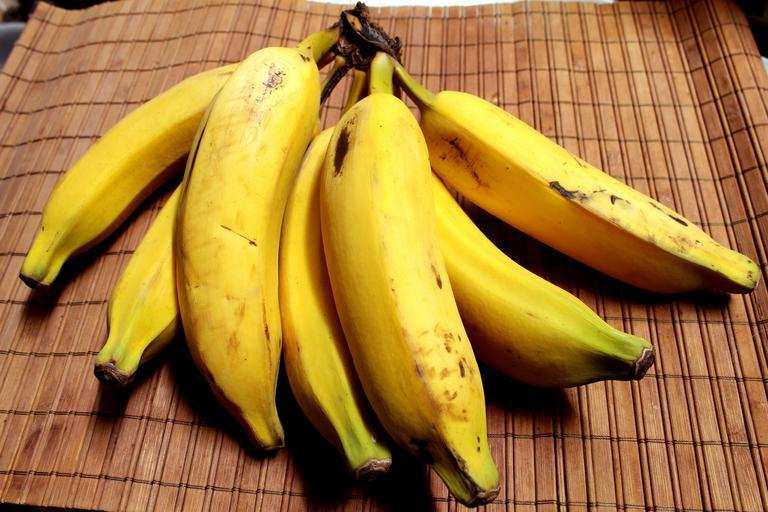I grew up hating bananas because I had a belief that they are purely meant for monkeys. I mean, why would I be competing with monkeys for food? That was in the past though, now I have seen the light. Hardly can a week pass now without me getting bananas for myself and my household.
[banana](https://snappygoat.com/free-public-domain-images-banana_fruit_tropical_fruit/Zouarz9hbSyh1Ag-SD1U2Ln2tgKsRdxg0vkNB9Fraow.html#,0,0.72843291cb084c158362ec9252da3e1fb90df075)
Bananas are life-saving and are packed with many essential nutrients. They are one of the most versatile fruits that you can find throughout the year. It is great for hair and skin, and it brings just the right amount of sweetness and smooth consistency when baked with other ingredients or mixed into smoothies. They are an excellent food for virtually everyone, including patients with type 2 diabetes, those suffering from celiac disease, and growing children. Perhaps you are someone I use to be by not liking bananas, your preference will likely change after reading this article. Bananas are among the most popular fruits in the world. They are native to Southeast Asia and Australia but are now grown in many warmer parts of the world. They are of different species and varieties with the latter limited by color, shape, and size. One of the species of bananas is popularly known as plantain and is primarily used to make [dodo](https://cooking.nytimes.com/recipes/1020283-dodo-fried-plantains) and powdered flower in the Southwestern part of Nigeria. The most common type of banana is cavendish, which is a type of sweet banana. Depending on the species, the stem of bananas can grow as high as 5 meters and as low as just 3 meters or even lower. Bananas are very easy to propagate. Propagation is asexual whereby a mature plant gives off a young sucker that grows upward from its root. The sucker is manually detached from its parent using appropriate instruments and transplanted to a new location where it spends a few days acclimatizing before starting to give off new leaves as a sign of growth. They are perennial in nature and the fruits are borne as bunches. Nutritionally, bananas are particularly rich in carbohydrates and contain appropriate amounts of many important nutrients such as vitamins, minerals, and antioxidants. It is rich in dietary fiber, protein, carbohydrates, potassium, iron, magnesium, calcium, vitamin B6, manganese, vitamins A, B, and C, and antioxidants such as dopamine and catechin. A medium-sized banana contains about 89 calories, 23 g of carbohydrates, 1.1 g protein, 0.3 mg fat, 1 mg sodium, and 358 mg of potassium. In addition, banana contains essential vitamins such as vitamin C, B6, A and other essential nutrients such as magnesium and iron.
https://images.hive.blog/768x0/https://files.peakd.com/file/peakd-hive/gentleshaid/VfhXZHh2-16110496618312813441117377773236.jpg
plantain
### Benefits of banana - Bananas are a good source of potassium. The nutrient is an important component of body electrolyte and helps in lowering blood pressure by relaxing the walls of blood vessels in people with elevated blood pressure levels. Hence, it comes highly recommended for people with high blood pressure/hypertension.[ref](https://www.medicalnewstoday.com/articles/322284) - Consumption of the fruit helps excrete excess sodium in the urine, reduces the risk of degenerative diseases, reduces the risk of stroke and is beneficial for heart and kidney health.[ref](https://www.medicalnewstoday.com/articles/271157) - The American Medical Association supported bananas as a healthy food for children in the early 20th century and was erroneously recommended as a treatment for celiac disease. Celiac disease was later discovered to be an autoimmune disease that gets triggered by gluten in genetically predisposed children. Since then, the idea that bananas can treat celiac disease has been jettisoned. That does not take anything away from bananas as an awesome food for children though. [ref](https://www.npr.org/sections/thesalt/2017/05/24/529527564/doctors-once-thought-bananas-cured-celiac-disease-it-saved-kids-lives-at-a-cost) - Bananas can help replenish electrolytes such as potassium that are lost with diarrhea or vomiting and contain resistant starch that supports healing of the intestine. - They help you feel more full which leads to weight loss and it reduces inflammation and prevents type 2 diabetes. - Banana fixes digestion and treats gastrointestinal issues such as constipation, stomach ulcers, heartburn, acid reflux and low lactose intolerance. The fiber content of bananas increases proper bowel movements which makes it valuable in the diet of people suffering from constipation. If there is a stomach ulcer, bananas help neutralize the excess acidity of gastric juice produced in the stomach, which reduces the effect of the ulcer. - There is evidence that the source of probiotics in bananas may help make cold and flu less severe. In addition, eating bananas can lower body temperature and give you coolness during fever or summer days. - Iron present in bananas helps in the absorption of iron, protects our body from the cell and strengthens the blood from tissue damage, and relieves anemia. - Bananas help relieve depression due to high levels of tryptophan. This serotonin "happy mood brain neurotransmitter" supports brain health by producing a hormone that affects our sleep cycle, mood, and experiences of stress and pain. - Banana is good for stress control. The potassium content in bananas helps normalize the heartbeat and regulates the body's water balance, which in turn controls stress. - The fruit comes highly recommended for women. Vitamin B6 is good for pregnant women and lactating mothers, and it helps to meet their child's developmental needs. It also helps the body to produce red blood cells, metabolize amino acids, and maintain a healthy nervous system. Bananas contain a fair amount of protein and folate which prevents the distortion of the fetus's nervous system. The fruit has also been reported to be of help in the mitigation of menstrual cramps. #### A quick DIY Banana Smoothie Ingredients: - 3 very ripe bananas - 3 cups pure mango - 1 cup of water - 2 teaspoons pumpkin seeds - 1 cup ice cubes - Any sweetener of your choice Preparation: Place bananas, pure mangoes, pumpkin seeds, sweetener, ice cubes and water in a blender; blend until smooth. Serve cold and enjoy with friends and family members. Thank you all for reading. #### References - https://en.wikipedia.org/wiki/Banana - https://www.iita.org/cropsnew/banana-plantain/

Originally posted here: https://hive.blog/hive-196387/@gentleshaid/lets-go-banana
No comments:
Post a Comment